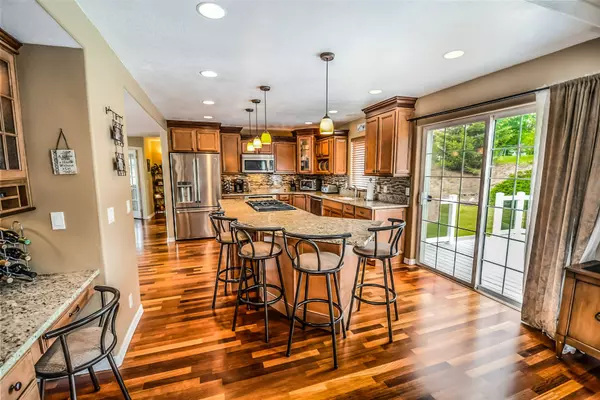Healthy Home Habits: Creating a Nurturing Living Environment

Introduction Maintaining a healthy living environment in our homes is crucial for our well-being. The quality of the air we breathe, the cleanliness of our surroundings, and the minimization of allergens all contribute to a healthier and more comfortable home life. In this blog, we explore practica
Read MoreTechnology for Homeowners: Enhancing Your Home Living with Smart Technology

Introduction In today's fast-paced world, smart home technology has revolutionized the way we live and interact with our homes. From automation systems to smart appliances, these advancements offer convenience, efficiency, and enhanced security. This blog explores how smart home technology can tran
Read MoreNavigating the New Year as a First-Time Seller: A Guide to a Successful Sale

Introduction The new year brings new opportunities, and for many homeowners, it's the perfect time to take the leap into selling their home for the first time. Navigating the real estate market as a first-time seller can be daunting, but with the right guidance and preparation, you can ensure a smo
Read MoreNew Year, New Home: Navigating the Home Buying Journey in the New Year

Introduction The start of a new year is often seen as a time for new beginnings, and for many, this includes the exciting prospect of buying a new home. Whether you're a first-time buyer or looking to upgrade or downsize, purchasing a home is a significant decision that requires careful planning a
Read MorePet-Friendly Home Features: Finding the Perfect Home for You and Your Furry Friends Introduction

For many of us, pets are more than just animals; they are family. As a result, finding a home that accommodates the needs of our furry friends is essential. Whether you're looking for a home in a pet-friendly neighborhood or seeking specific features to keep your pets comfortable and safe, there ar
Read MoreRelocating to Denver, Colorado: Your Comprehensive Guide

Denver, Colorado, a city known for its vibrant culture, stunning natural beauty, and thriving economy, is an increasingly popular destination for relocation. Whether you're moving to or from the area, the process can be both exciting and overwhelming. This guide offers practical tips, neighborhood
Read MoreRemote Work and Home Office Design: Enhancing Productivity and Style in Your Space

The shift towards remote work has transformed our living spaces into multifunctional hubs, especially in areas like Thornton, Brighton, and Commerce City. As experts in home design and functionality, we at Connect4homes understand the importance of a well-crafted home office. Here, we de
Read MoreReal Estate Resolutions: Navigating the Property Market in the New Year

Embracing Opportunities and Challenges in Real Estate for the Upcoming Year As we step into a new year, the real estate landscape presents both exciting opportunities and unique challenges. Whether you're a first-time homebuyer, a seasoned investor, or considering selling your property, the turn of
Read MoreDiscovering Colorado Real Estate: Opportunities in the Mountain State

Unlocking the Potential of Colorado's Diverse Property Market Welcome to the world of Colorado real estate, where the fusion of urban sophistication and natural splendor presents unique opportunities for buyers, sellers, and investors alike. Colorado's Real Estate Landscape: A Snapshot Colorado's
Read MoreNavigating the Colorado Housing Market: A Buyer's Guide

Making Your Dream Home a Reality in the Centennial State For many, buying a home in Colorado is not just a real estate transaction but the pursuit of a dream – to live in a state where natural beauty meets vibrant communities. As a buyer in the dynamic Colorado housing market, understanding key stra
Read MoreCaptivating Colorado: Design and Architecture Trends for Mountain Living

Embracing the Natural Elegance of the Rockies in Home Design Colorado's unique landscape, from its majestic mountains to its sprawling plains, not only offers breathtaking views but also inspires distinct design and architectural trends. Whether you’re renovating a ski chalet in Aspen or modernizin
Read MoreNavigating the Rockies: Essential Tips for First-Time Home Buyers in Colorado

Embark on Your Home Buying Journey in the Centennial State Buying your first home is a significant milestone, and in a market as diverse and dynamic as Colorado's, it requires special consideration. From the bustling streets of Denver to the serene landscapes of the Rockies, Colorado offers a uniqu
Read MoreInterior Design and Home Improvement Tips for Colorado Homes

Elevate Your Space with Mountain-Inspired Elegance Nestled in the heart of the Rockies, Colorado homes boast a unique blend of natural beauty and modern living. Whether you’re in a cozy cabin, a suburban house, or a sleek city apartment, these interior design and home improvement tips are tailored
Read MoreHoliday Decorating Ideas for the Christmas Season

Transform Your Home into a Winter Wonderland As the calendar turns from Thanksgiving to December, it's time to deck the halls and embrace the spirit of Christmas. Whether you prefer a classic, whimsical, or modern holiday look, these holiday decorating ideas will help you bring the warmth and joy o
Read MoreSeasonal Home Maintenance Tips for Colorado Homeowners

Embrace the Seasons, Protect Your Home Welcome to Colorado, where our stunning landscapes are matched only by the diversity of our seasons. Each season in Colorado brings its own charm and challenges, especially when it comes to maintaining your home. In this blog, we’ll guide you through essential
Read MoreThanksgiving Cooking Tips: A Stress-Free Guide to Holiday Feasting

Simplify Your Thanksgiving Kitchen Experience Thanksgiving is a time for family, gratitude, and of course, a lot of food. But let's face it, preparing a Thanksgiving feast can be overwhelming. Whether you're hosting a large gathering or a small dinner, these cooking tips will help you navigate the
Read MoreExploring Commerce City, Colorado: Top Things to Do and See

Welcome to Commerce City, Colorado, a hidden gem nestled in the Denver metropolitan area. Known for its vibrant community and scenic landscapes, Commerce City is a place where adventure and tranquility coexist. Whether you're a local or a visitor, there's an abundance of activities to enjoy. Here's
Read More-

Understanding Home Appraisals Home appraisals are an essential part of the real estate process, serving as a neutral evaluation of a property's value. Whether you are a seller or a buyer, understanding home appraisals is crucial to ensure a fair and accurate assessment. In this blog, we will delve i
Read More -

When it comes to selling your home, there are several factors that can greatly influence the success of your sale. From preparing your property to finding the right neighborhood, here are some essential tips to keep in mind to ensure a smooth and efficient home-selling process. One of the first thin
Read More
Categories
Recent Posts










